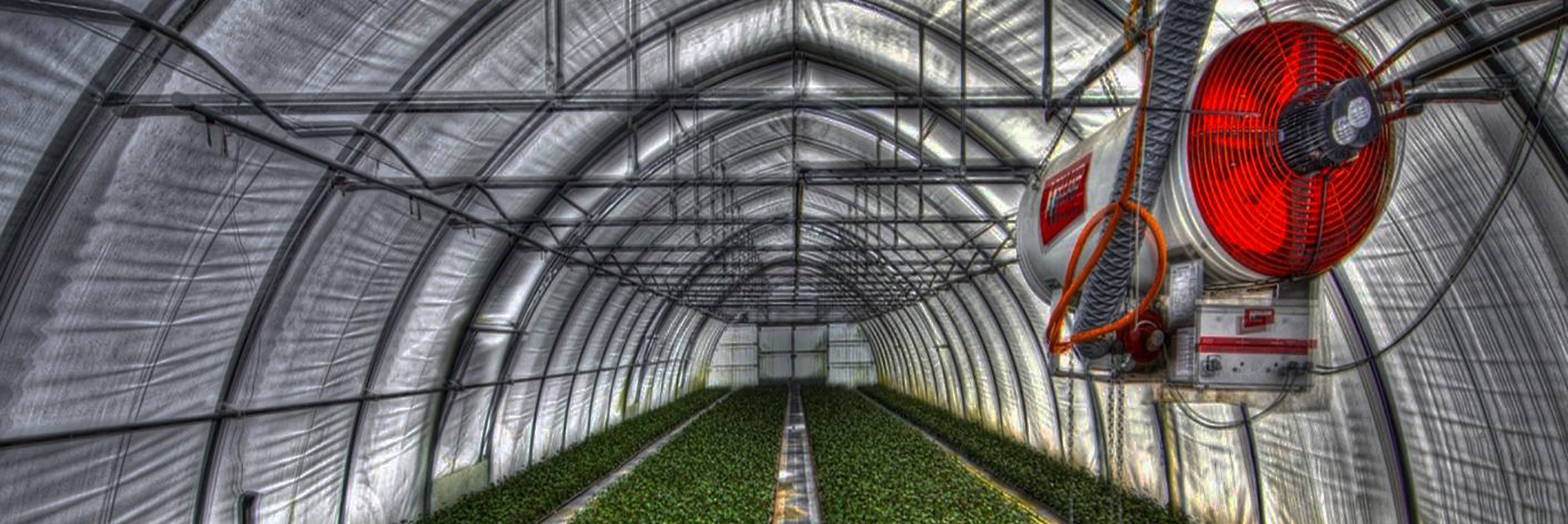
Eco-trust agriculture is a creative way to alter the traditional agricultural. It summarizes and refines the past experience.
2. Who proposed it?The production process of eco-trusting agriculture (planting and breeding) is based on the principles of eco-agriculture. In order to protect the environment and produce safe food, we should respect the difference of the difficulty of crop planting and the actual operation level of farmers, and produce safe, high-quality and delicious agricultural products and make the production records open and transparent by not using synthetic chemicals such as fertilizers and pesticides.
The transaction process of eco-trusting agriculture is to establish the direct relationship between producer and consumer to achieve information sharing, common feelings, win-win interests. It commit to building a trust as the core of the transaction and marketing mode. With the power of consumers to support the good development of the production process, so as to achieve these goals of increasing farmers' income, environmental protection, solving food safety problems and improving the integrity of agricultural products trading system.
Ecological Trust Agriculture was jointly proposed by the Beijing Leping Social Entrepreneur Foundation and Daichi wo Mamoru Kai (Japan).
3. What is the core content?the core content of Ecological Trust Agriculture:
 What Problem Did We Spot?
What Problem Did We Spot?
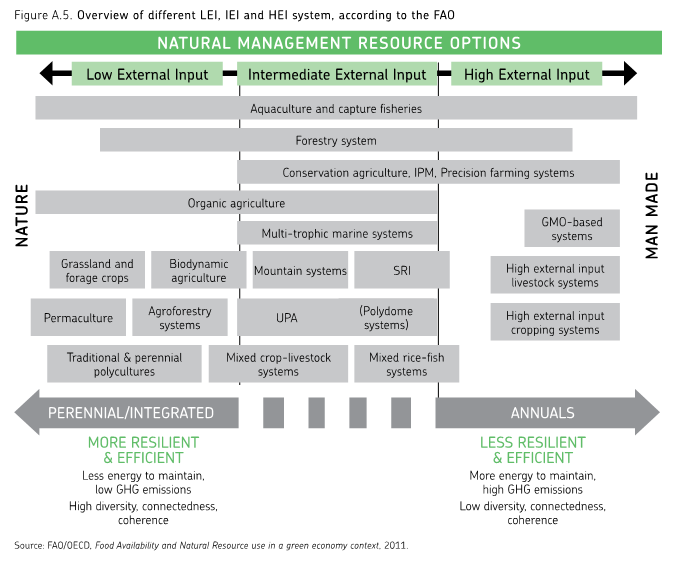
In the exploration of the past 10 years in rural areas, Leping found that in order to pursue efficiency and income, agricultural producers use chemical fertilizers and pesticides in excess of the standard. If planted in an organic way, the output is low, the production cost is high, and the market recognition of high price is low. Such a mode of agricultural production for farmers not only has a low income, affecting their health, but also destroys the soil environment, resulting in a vicious circle. For consumers, the lack of effective access to information on agricultural production safety, the rampant phenomenon of counterfeiting and inferiority makes consumers gradually lose trust to producers.
 Our Solution
Our Solution

Cooperate with farmers in a "negotiable" manner:
The Eco-Trust Agriculture primary innovation is the attitude towards cooperative farmers: respecting individual differences, respecting the actual production situation and farmers have the right to negotiate in the whole production process.
For example, when a farmer encounters an outbreak of aphids in the process of growing wheat, it is very likely that the crop will be cut off. What should he do at that time? According to organic agriculture standards, farmers can only continue to choose slow-acting biological control methods. If it has little effect, it is still unavoidable that the yield will drop dramatically. Farmers in Eco-Trust Agriculture can use their right to negotiate with us when facing this problem. If both sides reach an agreement, then under the premise of ensuring the safety of the final product, the scientific use of chemicals with obvious effects can also be accepted. This is far more reasonable than the choice of taking risks or deceiving facts in order to meet organic standards.
Innovation in the Establishment of Credit System: Transparency of Production Records:
The process of cooperation between eco-trust agriculture and farmers can be divided into four steps. First, before agricultural production begins, farmers sign contracts with customers. Farmers need to abide by the "Fuping-Dadi Eco-trust Agriculture Standards and Regulations". In order to ensure farmers' income, we agree with them on the competitive price and quantity of commodity acquisition. That is to say, farmers have the right to bargain at the same time. 。 Secondly, farmers should record all agricultural operations related to the agreed products, including fertilization and pesticide use, in accordance with the provisions of the contract, and form a production record for timely updating and regular submission. Thirdly, in the production process, the ecological trust agricultural inspectors conduct field inspections at specific time according to the characteristics of each crop to determine whether the actual situation is consistent with the production records. Fourthly, pesticide residues are detected by a third-party testing agency before the product goes public.
As the core value of eco-trust agriculture, Production Record provides consumers with information that can help them judge whether the production process is safe or not. The contract provides the basis for farmers to record the production process. The field inspection ensures the authenticity of the continuous updating of the production records. The product testing is the guarantee of the results of the production records. In addition, based on the negotiable attitude in the process of cooperation with peasant households, peasant households need not deceive the facts, and the production record is true information.
All current agricultural standards are the result of judgment for consumers. The innovation of eco-trust agriculture lies in providing consumers with real production process and corresponding pesticide residue detection reports. Consumers have the right to know and exercise their subjective judgment. It helps to build innovative thinking.
 Trustful farm: digital plantform
Trustful farm: digital plantform1.why do we need trustful farm?
The acreage per person owned of the United States, France and Germany is 145, 55 and 45 times that of China.
-The production efficiency of China's major crops is 1 kg/square, and that of developed countries is 2 kg/square.
-The fertilizer utilization rate is 35% in China and 65% in developed countries.
-The utilization rate of pesticides in China is 25%, and that in developed countries is 50-60%.
-New professional farmers will engage in agriculture, who will accustomed to new model as soon as quickly.
-The structure of labor force will change and growers will be cut off.
2. what’s the significance of trustful farm?
-Artificial intelligence, big data and other industries are developing rapidly in China, which provides the possibility to analyze the complex agricultural production process.
-Farmers do not rely on experience, but use the sustained production data to make decisions.
-Excessive and unreasonable application of inputs, even organic fertilizers and other substances, not only reduces the efficiency of agricultural production, but also has a negative impact on the environment.
-As an emerging resource, data has been successfully applied in other fields. The sustainable resource like date should be fully applied in agriculture.
-Data-based production process provides convenience for farmers to learn from each other.
-Promote agricultural production technology by elite farms.
-At the same time, it also provides raw materials for companies and scientific research institutions upstream and downstream of the industrial chain.
Please consult
official account if you want to learn about more.

 Studying program
Studying programBeginning with changing the agricultural planting concept and improving the ability to manage, Leping promotes the concept of ecological trust in agriculture in China's current agricultural environment. Therefore, Leping set up the Eco-trust Agricultural College at the end of 2012, and set up the Eco-trust Agricultural Planting Demonstration Farm---Zhongyuan Farm in Tianjin as a teaching base to recruit young people who have a good educational background and are willing to engage in eco-trust agriculture for a long time. They cultivate agricultural talents who have eco-trust concept or advanced skills by multi-teaching
There is the top agricultural planting technology team at home and abroad in Eco-trust Agricultural College. It cooperated with Chinese Academy of Agricultural Sciences, Tianjin Academy of Agricultural Sciences, Tianjin college of Agricultural Sciences and other agricultural research institutions to contribute to the training of new professional farmers.
By the end of 2017, more than 50 students had successfully graduated from the Eco-trust Agricultural College, and most of them engaged in agriculture to develop their knowledge.
Please consult
official account if you want to learn about more.

In order to improve the market environment, Leping first came into contact with Daichi wo Mamoru Kai, which had more than 30 years of experience at that time. The concept of "building a trust relationship between producers and consumers" put forward by the association coincides with Leping's thinking in the field of agriculture. In 2009, Leping and Daichi wo Mamoru Kai reached a consensus, that is, to launch the program of ecological trust agriculture in China. Depending on investment, they started Beijing Fuping Chuangyuan Agricultural Science and Technology Development Co., Ltd, which is responsible to practice and promote the eco-trust agriculture.
Adjust the Industrial Chain Structure
The farmers’ right to bargain and the increase in revenue do not mean that consumers need to bear a higher economic burden. Eco-trust agriculture has readjusted the industrial chain structure.
Industrial Chain Structure: Traditional Model (Left) VS Ecological Trust Agriculture Model (Right)
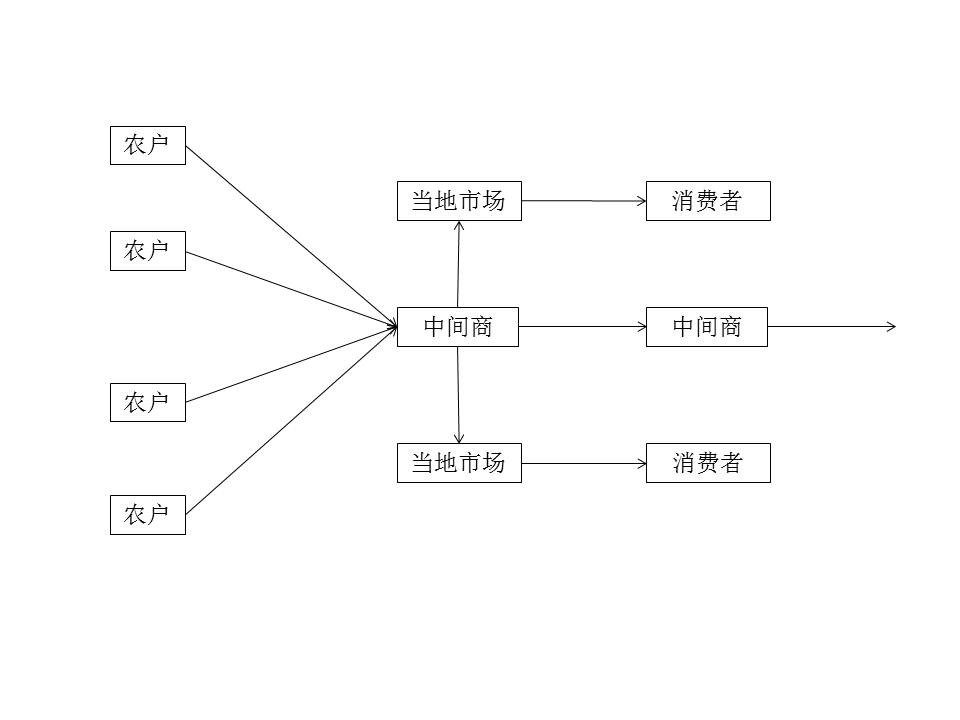
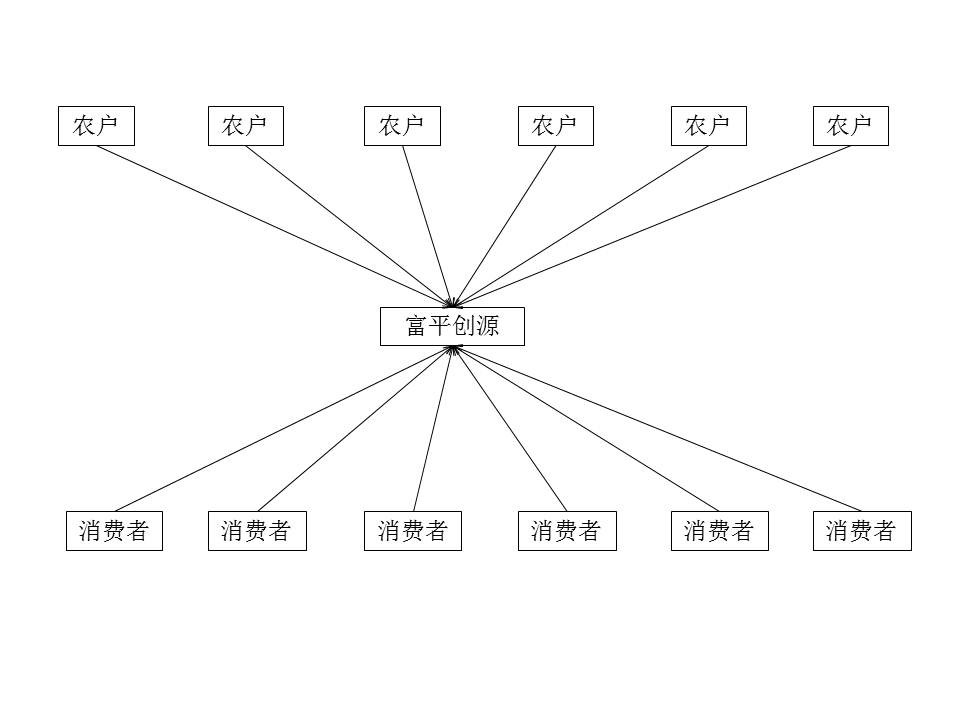
As the only platform between producers and consumers, Fuping Chuangyuan shortens the distance between consumers and producers, reduces the damage and quality decline of agricultural products in the logistics process, and avoids unreasonable premium of middlemen, uneven distribution of benefits in the industrial chain and asymmetric information.
Aim and Vision of Eco-trust Agriculture: Rebuilding Credit System and Improving Market Environment
With the establishment of increasing consumers, the scope of ecological trust agriculture will be more and more extensive. However, we still need to solve another problem in the future, that is, the quality and price of agricultural products should be rational. In theory, with the improvement of the quality of agricultural products, such as the reduction of agricultural residuals, will inevitably be accompanied by a reasonable increase in prices. However, in view of the current market environment, the relationship does not exist significantly.
For example, in 2017 Ecotrust Agriculture Team's survey on the amount of Apple commodity pesticide residues in Beijing (shown below), we can not find a reasonable relationship between safety level and price.
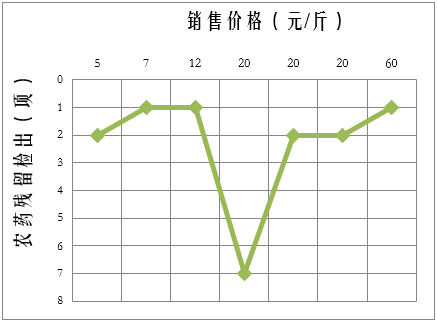
In the future, we hope to achieve a reasonable relationship through the understanding and support of consumers.
For example, Shandong Province is the region with the highest apple yield in China, its average annual pesticide use of 8-9 times and the purchase price is about 3 yuan per kilogram. In fact, the reduction in the use of pesticides will improve the safety of apples, contribute to environmental protection and protect farmers themselves. If consumers understand above ideas, we can agree with farmers to reduce the use of pesticides once, our purchase price will increase by 10%, until farmers can no longer reduce the use of pesticides due to objective facts. Assuming that farmers use pesticides at least four times, then the purchase price will increase by 40%.
Furtherly, we should consider the circumstance and the ability to recognition of farmers to achieve the above aim. The price increase is based on the improvement of the quality of agricultural products, and the price of agricultural products should only be related to the quality of agricultural products. This is the market model that ecological trust agriculture has been trying to establish.
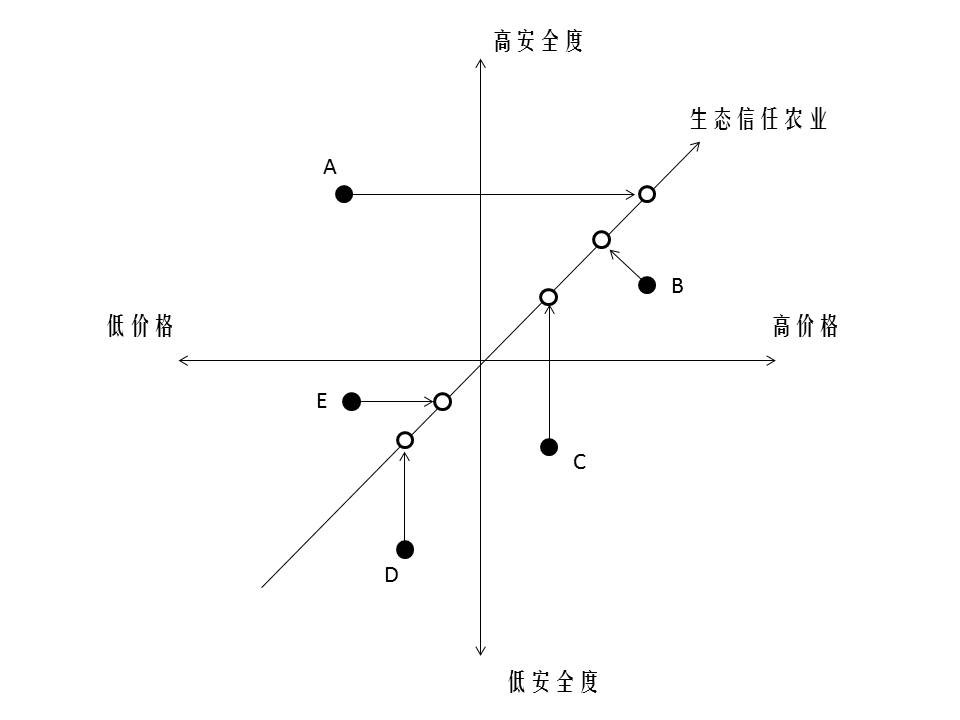
As
shown in the figure above, the productions produced by the Farmer A are safer but lack of
market access. Meanwhile, B/C farmers' product prices are obviously not in line
with product safety, and D/E farmers' products are dissatisfied in terms of
safety and price. We need a good market
to regulate and improve the relationship between price and safety.


